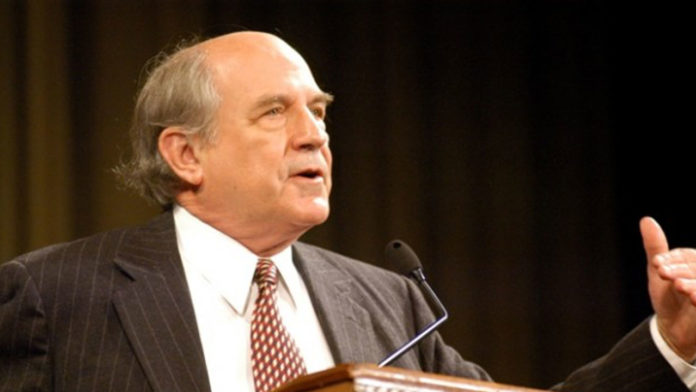Alpha News interviewed by phone Dr. Charles Murray the day before his Twin Cities appearance on June 8, 2017. Murray is undoubtedly America’s most famous sociologist, having co-authored with the late Richard Herrnstein the landmark book “The Bell Curve,” among many other influential books. Dr. Murray was a singularly strident Never Trumper in the last election. He’s a fellow at the American Enterprise Institute in Washington, D.C.
During his recent tour of college campuses, he was driven out of Middlebury College and his professor-invitee physically assaulted and injured. The incident received widespread national coverage and consequently Dr. Murray became, not necessarily with his approval, the posterchild for the free speech on campus movement, something many thought had been fought for and won some time ago.
Despite being shut down, Dr. Murray was on record in his belief that Milo Yiannopoulos was not entitled to be heard at publicly supported university campuses. In this interview, news is made when he was challenged to rethink that position and Dr. Murray did in fact reverse himself.
Alpha News contributor John Gilmore interviewed Dr. Murray. The interview has been edited for flow and clarity. Dr. Murray was in the Twin Cities as a guest of Intellectual TakeOut for their Spring Gala. Gilmore wishes to thank Devin Foley of ITO for arranging the interview.
JG: Dr. Murray, thank you for taking time for this interview. How did we get to Middlebury?
CM: The protests changed, in my experience, immediately after the election. Until the election, for several years I had occasionally had student groups that would protest a college appearance and these were always scripted so that the protesters would stand and hold signs for a minute at the beginning of my speech and then walk out or they would stand with their backs to me for ten minutes and then walk out, things like that.
After the election, the protests as I went to campuses grew larger and longer, but they continued to be scripted. My own view is that the election of Trump triggered a great deal of anger on the Left, among college students, and they want somebody to take it out on. A conservative speaker, even if he’s a Never Trumper, like I am . . .
JG: That you are.
CM: Oh yeah, very openly admitted Never Trump, and so it doesn’t make any difference, we got from the normal kind of protests to the current kind of protests, I think, with the election of Donald Trump. Which doesn’t excuse it, I’m just saying I think that’s the inflection point.
JG: But that didn’t come out of nowhere. What was happening on college campuses, in your view, that pre-dated Trump’s election?
CM: As I said, before that there were very minor protests but basically “The Bell Curve” had been pretty much forgotten. The students in colleges where I was going hadn’t even heard of “The Bell Curve.” It had been printed before most of them were born. And the book I was known for at the time I was speaking for the last few years was “Coming Apart,” which got bipartisan praise.
So if you’re talking about me personally, I’m just repeating myself, but I think it was the election of Donald Trump that raised all these old issues. I’m answering a question twice.
JG: I listened to your podcast with Sam Harris, who likely wouldn’t have the profile he does, in my view, had he not stood in the shadow of the late Christopher Hitchens. In any event, I was struck that Harris had to tell his listeners at the outset that you were no “Heinrich Himmler.” I was a bit taken aback.
I know you don’t identify as a republican, neither do I. But it seems to me we’ve lost the thread: the question is what has conservatism conserved in the last thirty years? Is that a fair question?
CM: It has not done very well. I consider that both Bushes frittered away their patrimony that they inherited from Ronald Reagan. I don’t think either one of them governed as a conservative, in any meaningful sense of that term. I think the Republican Congress after their triumph in 1994, which was very heartening, also frittered away their possibilities.
First with Newt Gingrich, being very politically inept, and then, with the rise of a conservative control of the House, that was every bit as corrupt as anything that the Democrats have ever done. During the George W. Bush years, with the passage of the Medicare prescription bill, was more corrupt than in any single act of the Democrats. Which is to say, they passed the Medicare prescription bill with open disregard of the House rules.
You’ve had a lack of principled conservatism, I would say, since 1988.
JG: That’s a long time.
CM: The answer to your question is that conservatives haven’t conserved much at all.
JG: Sam Harris, in his podcast with you, said that “Coming Apart,” the book you’re touring behind, was “almost prophetic” and showed “a Trump shaped hole” in the heart of America. What did you think of that observation? The one thing I ask Never Trumpers is that in retrospect wasn’t it obvious that only a Trump could fill that “Trump shaped hole?” in America, whatever you think of the man personally or individually?
CM: I think it’s a choice between FUBAR and SNAFU. Niall Ferguson made that distinction.
JG: I call him Ayaan’s husband, but that’s just me.
CM: You had a choice between Hillary, which would have been SNAFU, it would have been more of the same. With Trump you did have a prospect of some rewards. We’ve gotten some rewards, even now, in the form of Gorsuch and in the form of cabinet and subcabinet appointees who were very good. Scott Gottlieb at FDA is going to be a huge improvement over the alternative in the Clinton administration. The FTC guy, who’s name I forget, Mattis is far better than any Secretary of Defense that Hillary Clinton would have appointed. So there are those upsides.
We are also, and I think the experience of the first several months have demonstrated this, in the hands of a man who is totally incompetent in using federal power. He’s used the power of appointment well to some degree. And he’s used Executive Orders but that’s kind of a weak reed to get a lot done with, in a permanent way.
But his understanding of here’s how you get a bill crafted, here’s how you get it through, here is how, for example, you implement his ambitious plans for the regulatory state, downsizing that, nothing he has said gives me any indication that he understands how the regulatory state works. Understands anything about the authority of regulatory agencies to craft regulations independently of whatever the President does. Etcetera, etcetera, etcetera.
JG: At best Trump’s incompetent, at worst he is?
CM: At worst he’s dangerously incompetent. Dangerous in terms of the security of the nation. How do you balance that one out? I’m really glad about the good things that have happened, and my hope is that we will prove over the next four years that we don’t need a competent White House.
JG: What is your opinion then about the incompetence of Congressional Republicans? Don’t they share any of the blame given their performance?
CM: I’ve been very disappointed in the House. And I have been formerly a great admirer of Paul Ryan. Replacing Obamacare represents–in the first place I haven’t followed it closely enough–to really know what I’m talking about is that they wanted to get a bill that passed with 51 votes, which couldn’t be filibustered. The fact is that in order to have a defendable replacement for Obamacare, it couldn’t be a bill that could be snuck through. It had to be a bill that republicans were prepared to break a filibuster in the Senate with and get it passed.
It was short sighted on the part of the republicans, it lacked vision, it lacked courage of convictions, it was extremely incompetent. So I’m not happy about that either.
JG: So you hold out hope that Trump could master the governing learning curve in the future?
CM: If you can give me any evidence that this president has mastered anything over the last six months I’d be delighted to hear it. You have unprecedented leaking. We can say these are self-serving comments, okay. But the sum total of the portrayal of a man who has to be treated the way you treat a toddler “keep him diverted so he doesn’t have a chance to get to his Twitter handle!”
JG interrupting: Sorry to interrupt Dr. Murray but do you actually believe that? Do you actually believe what you read?
CM: Oh yeah, I believe some of it. Let me take a position here on journalists I know people on the right will have a hard time accepting. I think that within the ranks of mainstream journalists, there are some really good people and there are some people that I wouldn’t believe at all. Those reporters, I’ll say as a matter of personal experience, the best of the NYTImes reporters and the best of the Washington Post reporters that have interviewed me and then written stories about me, have been scrupulously accurate down to the last nuance in correctly conveying in what I said and the rest of it.
In other words, and this is an example of the excessive polarization that has blinded people on both sides, there are reporters in the news industry who are superb professionals. I’ll take it to the bank what they write. Some of those stories [about Trump] are from those people at the New York Times and Washington Post fall into that category. Do I believe everything I read about Trump? No. Do I think these people are making it up? Do I think they’re getting multiple sources independently? Yeah, I do.
JG: Huh. Circling back to college campuses, you were recently quoted as saying “universities are all about free exchange of ideas. They (sic) are stipulations. I think that it’s appropriate to say that on a college campus, you must use evidence and logic and be civil. I would say that someone like Milo Yiannopoulos does not meet those stipulations.”
Have you changed your thinking about that statement in any regard Dr. Murray? Because I wonder if the very criteria you use, which in fact has been used against you personally, is so expansively used on the Left and not in good faith, that we actually surrender what should be fought for: First Amendment rights on state funded universities and colleges.
CM: I take your point. I’m very much a First Amendment absolutist. You’ve pushed me to the wall on it. Okay then I’ll back down from that. But I’d do so reluctantly for the following reasons.
We on the Right are not required to sink to the level of the people we are arguing with. All during the campaign I got the same thing in my Twitter feed: look what they’re doing, nice guys finish last, it’s time to use the weapons that need to be used, the ends justify the means.
I’ll tell you what. I’m of the school which says I don’t want to be those people. I want to continue to say: Look, I meet the standards of civility and argument and evidence. I defy anybody on YouTube to come up with any of the hundreds of clips you have on me where I have failed to meet that standard.
You can say “oh they’ll say you shouldn’t be allowed on because we can interpret these standards so that you don’t fit.” Yeah, they can do that but they won’t be telling the truth.
I need to be comfortable with who I am and what I do. And when people tell me that we’ve got to do things that are degrading to ourselves, I say thanks but no thanks. It’s not for me. So, for example, is it pronounced “mee low?”
JG: It’s pronounced “my low.”
CM: I think what he does is despicable. I think he’s saying what he’s saying for reasons that range from nasty to merely juvenile.
JG: True, a little bit of Milo goes a long way.
CM: There’s nothing on a college campus that contributes to what a college is all about. It’s like many things with my libertarianism: in terms of what I think the government should and should not do, I’m actually a pretty strict libertarian.
But in terms of my feelings about the importance of self governance, by which I mean the governance of the self by the individual, in terms of self governance it is essential for a free society that people refrain from doing things that are legal on grounds that they inappropriate, unseemly, wrong or vulgar.
And I know that lots of people who are reading this, I know exactly what they are saying: “Oh it’s that kind of attitude that means the Republic is going down the drain. It’s time to fight back.”
I’m saying that I’m standing foursquare with the principles that were enunciated by Madison, Jefferson, Adams, Washington, and so forth. I don’t think you conserve what has made the United States uniquely wonderful in the world by changing it into a system which throws away those qualities in the name of a kind of, well, we’re still the same country, we’ll still have the same name, but we’ll be completely different from a country with a spirit that used to make us special.
JG: But Dr. Murray, don’t you think those people you referenced would say that that’s already happening? That cultural Marxism is changing the country under our feet while you talk about Jefferson and Adams?
CM: Donald Trump does some things that please a person of my views and my principles. He does not do them because he believes in them. They are part of the package of things that got him elected. His inclinations do not match up, as far as I can tell, with any coherent philosophy that resembles anything like limited government, the rule of law, restraint of executive power, etc.
Cultural Marxism I do not find any worse in any important respect to the kind of culture that Donald Trump represents. If you’re talking about culture, and the culture that Donald Trump lives in his life, it is a culture of disdain for people who are below him, a bullying, dishonesty, in which screwing your business partners and contractors is a business model for him. It is a kind of lack of respect for others. I don’t see anything that is more objectionable in cultural Marxism than in the way that Donald Trump sees the world, the way he lives his life and the example that he sets.
At the end of four years, if he becomes a popular president, I think we are going to have a culture that is every bit as toxic as the Middlebury culture that ended up getting my colleague there a concussion and a neck injury.
JG: Fascinating. Finally Dr. Murray, you’ve written a number of books. Which one did you enjoy writing the most?
CM: That’s a fun question. My favorite book in terms of being proud of it and also in terms of what it meant for my subsequent work is “In Pursuit” which was 1988. If you read what I wrote since then, the themes in “In Pursuit” continually recur. So that’s the book that’s my own personal favorite but books are like children so that you love them all but you love them for different reasons. My abused child was “The Bell Curve” and my neglected child was “Human Accomplishment.” And also the one that was the most fun to write–well there were two that were the most fun to write–one was “Apollo” which I wrote with my wife Catherine Cox about the Apollo program, came out in 1989 and is the only book I’ve written that got rave reviews. And the other was “The Curmudgeon’s Guide to Getting Ahead,” which came out a couple of years ago. Those were both lots and lots of fun to write.
JG: Thank you for your time Dr. Murray. My final question is the same one I ended my recent interview of David Horowitz with:
Have you heard of Based Stick Man?
CM: No.










